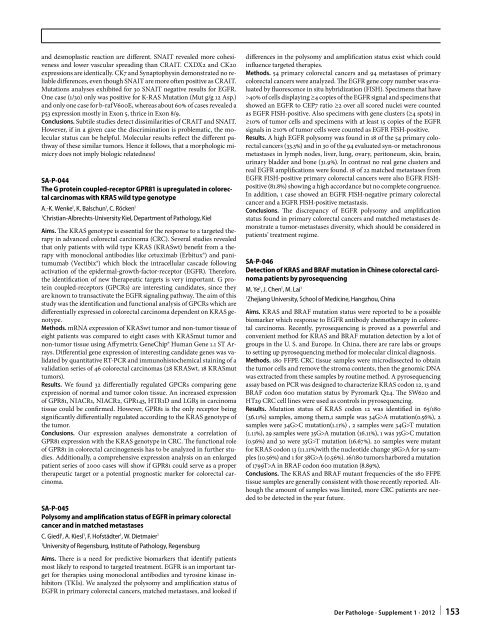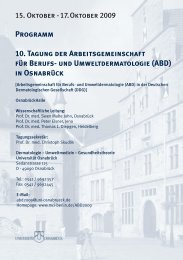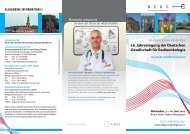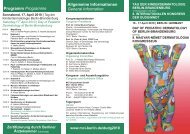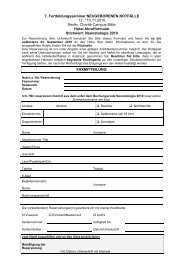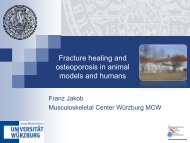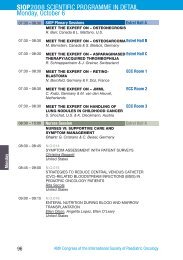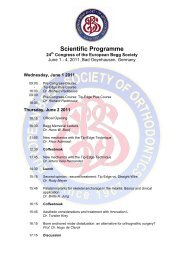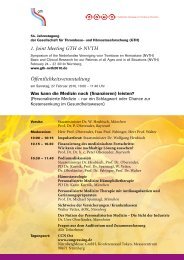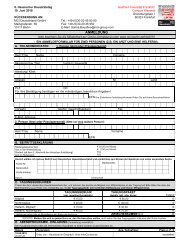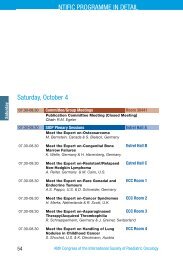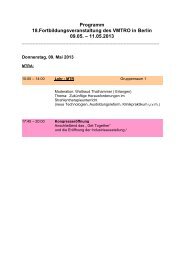96. Jahrestagung der Deutschen Gesellschaft für Pathologie e. V ...
96. Jahrestagung der Deutschen Gesellschaft für Pathologie e. V ...
96. Jahrestagung der Deutschen Gesellschaft für Pathologie e. V ...
You also want an ePaper? Increase the reach of your titles
YUMPU automatically turns print PDFs into web optimized ePapers that Google loves.
and desmoplastic reaction are different. SNAIT revealed more cohesiveness<br />
and lower vascular spreading than CRAIT. CXDX2 and CK20<br />
expressions are identically. CK7 and Synaptophysin demonstrated no reliable<br />
differences, even though SNAIT are more often positive as CRAIT.<br />
Mutations analyses exhibited for 30 SNAIT negative results for EGFR.<br />
One case (1/30) only was positive for K-RAS Mutation (Mut g/g 12 Asp.)<br />
and only one case for b-rafV600E, whereas about 60% of cases revealed a<br />
p53 expression mostly in Exon 5, thrice in Exon 8/9.<br />
Conclusions. Subtile studies detect dissimilarities of CRAIT and SNAIT.<br />
However, if in a given case the discrimination is problematic, the molecular<br />
status can be helpful. Molecular results reflect the different pathway<br />
of these similar tumors. Hence it follows, that a morphologic mimicry<br />
does not imply biologic relatedness!<br />
SA-P-044<br />
The G protein coupled-receptor GPR81 is upregulated in colorectal<br />
carcinomas with KRAS wild type genotype<br />
A .-K . Wenke1 , K . Balschun1 , C . Röcken1 1Christian-Albrechts-University Kiel, Department of Pathology, Kiel<br />
Aims. The KRAS genotype is essential for the response to a targeted therapy<br />
in advanced colorectal carcinoma (CRC). Several studies revealed<br />
that only patients with wild type KRAS (KRASwt) benefit from a therapy<br />
with monoclonal antibodies like cetuximab (Erbitux®) and panitumumab<br />
(Vectibix®) which block the intracellular cascade following<br />
activation of the epi<strong>der</strong>mal-growth-factor-receptor (EGFR). Therefore,<br />
the identification of new therapeutic targets is very important. G protein<br />
coupled-receptors (GPCRs) are interesting candidates, since they<br />
are known to transactivate the EGFR signaling pathway. The aim of this<br />
study was the identification and functional analysis of GPCRs which are<br />
differentially expressed in colorectal carcinoma dependent on KRAS genotype.<br />
Methods. mRNA expression of KRASwt tumor and non-tumor tissue of<br />
eight patients was compared to eight cases with KRASmut tumor and<br />
non-tumor tissue using Affymetrix GeneChip® Human Gene 1.1 ST Arrays.<br />
Differential gene expression of interesting candidate genes was validated<br />
by quantitative RT-PCR and immunohistochemical staining of a<br />
validation series of 46 colorectal carcinomas (28 KRASwt, 18 KRASmut<br />
tumors).<br />
Results. We found 32 differentially regulated GPCRs comparing gene<br />
expression of normal and tumor colon tissue. An increased expression<br />
of GPR81, NIACR1, NIACR2, GPR143, HTR1D and LGR5 in carcinoma<br />
tissue could be confirmed. However, GPR81 is the only receptor being<br />
significantly differentially regulated according to the KRAS genotype of<br />
the tumor.<br />
Conclusions. Our expression analyses demonstrate a correlation of<br />
GPR81 expression with the KRAS genotype in CRC. The functional role<br />
of GPR81 in colorectal carcinogenesis has to be analyzed in further studies.<br />
Additionally, a comprehensive expression analysis on an enlarged<br />
patient series of 2000 cases will show if GPR81 could serve as a proper<br />
therapeutic target or a potential prognostic marker for colorectal carcinoma.<br />
SA-P-045<br />
Polysomy and amplification status of EGFR in primary colorectal<br />
cancer and in matched metastases<br />
C . Giedl1 , A . Kiesl1 , F . Hofstädter1 , W . Dietmaier1 1University of Regensburg, Institute of Pathology, Regensburg<br />
Aims. There is a need for predictive biomarkers that identify patients<br />
most likely to respond to targeted treatment. EGFR is an important target<br />
for therapies using monoclonal antibodies and tyrosine kinase inhibitors<br />
(TKIs). We analyzed the polysomy and amplification status of<br />
EGFR in primary colorectal cancers, matched metastases, and looked if<br />
differences in the polysomy and amplification status exist which could<br />
influence targeted therapies.<br />
Methods. 54 primary colorectal cancers and 94 metastases of primary<br />
colorectal cancers were analyzed. The EGFR gene copy number was evaluated<br />
by fluorescence in situ hybridization (FISH). Specimens that have<br />
>40% of cells displaying ≥4 copies of the EGFR signal and specimens that<br />
showed an EGFR to CEP7 ratio ≥2 over all scored nuclei were counted<br />
as EGFR FISH-positive. Also specimens with gene clusters (≥4 spots) in<br />
≥10% of tumor cells and specimens with at least 15 copies of the EGFR<br />
signals in ≥10% of tumor cells were counted as EGFR FISH-positive.<br />
Results. A high EGFR polysomy was found in 18 of the 54 primary colorectal<br />
cancers (33.3%) and in 30 of the 94 evaluated syn-or metachronous<br />
metastases in lymph nodes, liver, lung, ovary, peritoneum, skin, brain,<br />
urinary blad<strong>der</strong> and bone (31.9%). In contrast no real gene clusters and<br />
real EGFR amplifications were found. 18 of 22 matched metastases from<br />
EGFR FISH-positive primary colorectal cancers were also EGFR FISHpositive<br />
(81.8%) showing a high accordance but no complete congruence.<br />
In addition, 1 case showed an EGFR FISH-negative primary colorectal<br />
cancer and a EGFR FISH-positive metastasis.<br />
Conclusions. The discrepancy of EGFR polysomy and amplification<br />
status found in primary colorectal cancers and matched metastases demonstrate<br />
a tumor-metastases diversity, which should be consi<strong>der</strong>ed in<br />
patients’ treatment regime.<br />
SA-P-046<br />
Detection of KRAS and BRAF mutation in Chinese colorectal carcinoma<br />
patients by pyrosequencing<br />
M . Ye1 , J . Chen1 , M . Lai1 1Zhejiang University, School of Medicine, Hangzhou, China<br />
Aims. KRAS and BRAF mutation status were reported to be a possible<br />
biomarker which response to EGFR antibody chemotherapy in colorectal<br />
carcinoma. Recently, pyrosequencing is proved as a powerful and<br />
convenient method for KRAS and BRAF mutation detection by a lot of<br />
groups in the U. S. and Europe. In China, there are rare labs or groups<br />
to setting up pyrosequencing method for molecular clinical diagnosis.<br />
Methods. 180 FFPE CRC tissue samples were microdissected to obtain<br />
the tumor cells and remove the stroma contents, then the genomic DNA<br />
was extracted from these samples by routine method. A pyrosequencing<br />
assay based on PCR was designed to characterize KRAS codon 12, 13 and<br />
BRAF codon 600 mutation status by Pyromark Q24. The SW620 and<br />
HT29 CRC cell lines were used as controls in pyrosequencing.<br />
Results. Mutation status of KRAS codon 12 was identified in 65/180<br />
(36.11%) samples, among them,1 sample was 34G>A mutation(0.56%), 2<br />
samples were 34G>C mutation(1.11%) , 2 samples were 34G>T mutation<br />
(1.11%), 29 samples were 35G>A mutation (16.11%), 1 was 35G>C mutation<br />
(0.56%) and 30 were 35G>T mutation (16.67%). 20 samples were mutant<br />
for KRAS codon 13 (11.11%)with the nucleotide change 38G>A for 19 samples<br />
(10.56%) and 1 for 38G>A (0.56%). 16/180 tumors harbored a mutation<br />
of 1799T>A in BRAF codon 600 mutation (8.89%).<br />
Conclusions. The KRAS and BRAF mutant frequencies of the 180 FFPE<br />
tissue samples are generally consistent with those recently reported. Although<br />
the amount of samples was limited, more CRC patients are needed<br />
to be detected in the year future.<br />
Der Pathologe · Supplement 1 · 2012 |<br />
153


